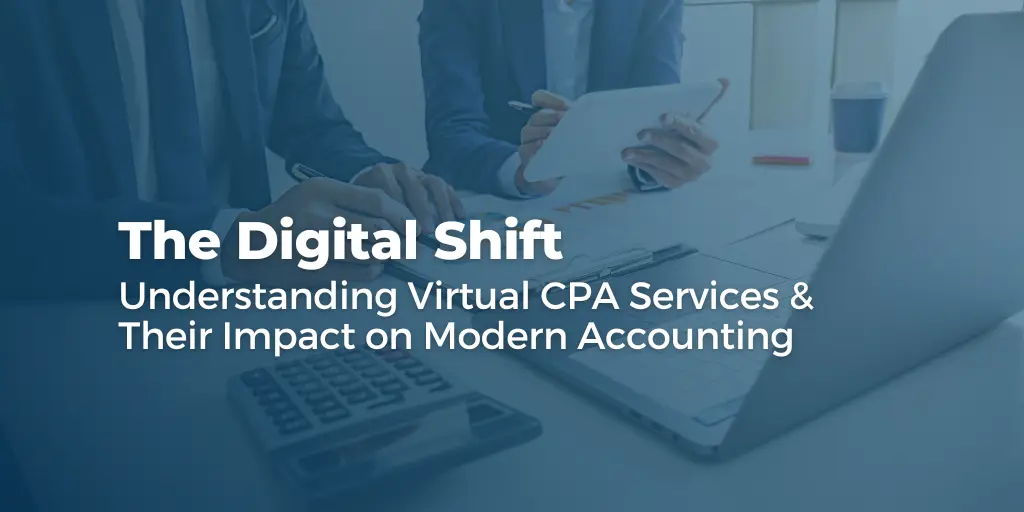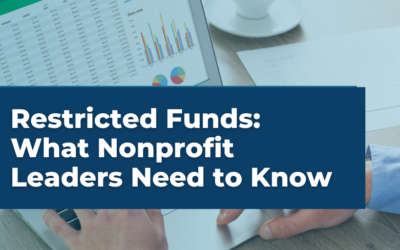Running a successful nonprofit or small business requires a great deal of time, effort, and resources. One of the most crucial aspects is managing finances effectively in order to grow at a consistent rate. However, for many small and medium-sized organizations, hiring a full-time accountant can be costly and time-consuming. That’s where virtual CPA services come in.
A virtual CPA offers the same level of expertise and support as an in-house accountant but at a fraction of the cost. With them as a team member, it’s easy to streamline the financial management processes, reduce the risk of errors, and gain valuable insights into your finances. In this article, we’ll explore how virtual accountants and bookkeepers are expediting financial growth and how they can help your organization stay ahead of the game.
Benefits of Using Virtual CPA Services
Virtual accounting firms offer a range of benefits that enable organizations to optimize their financial performance and drive sustainable growth. Here are 5 of the main benefits that we think they bring to an organization.
Increased Flexibility
Virtual CPA services provide unparalleled flexibility for both nonprofits and small businesses. By eliminating geographical barriers, organizations can collaborate seamlessly with their virtual CPAs from anywhere in the world. This flexibility enables timely decision-making, efficient financial management, and the ability to adapt to changing circumstances swiftly.
Accurate and Timely Reporting
Accurate and timely reporting is another significant benefit of using the advanced data analytics tools an accountant integrates. With the ability to process vast amounts of data quickly and efficiently, these tools enable organizations to generate accurate reports in a timely manner. By automating the data analysis process, businesses can minimize human errors and ensure the reliability of their reports. Additionally, real-time data updates and dynamic visualizations provided by these tools allow for immediate insights into key metrics, helping decision-makers make informed choices promptly.
Enhanced Data Security
Virtual CPA firms understand the importance of data security and employ robust measures to protect sensitive financial information. Through encrypted platforms and secure data storage systems, nonprofits and small businesses can trust that their financial data is safeguarded against unauthorized access and potential cyber threats.
Reduced Costs
Virtual CPA services eliminate the need for physical office space, allowing nonprofits and small businesses to save on overhead expenses such as rent and utilities. These cost savings can be reinvested into other critical areas of the organization, promoting growth and sustainability. Virtual CPA services often operate on a scalable model, allowing businesses to pay only for the services they require, whether it’s monthly bookkeeping, tax preparation, or financial analysis.
Access to Specialized Expertise
Virtual CPA services provide access to a team of highly skilled professionals with specialized knowledge in nonprofit and small business accounting. These experts understand the unique financial challenges faced by an organization and can offer tailored solutions and insights. By tapping into this wealth of expertise, organizations can make informed financial decisions, optimize their financial performance, and navigate complex regulations with confidence.
By leveraging virtual CPA services, both nonprofits and small businesses can unlock significant advantages that streamline their financial operations, reduce costs, improve accessibility, enhance data security, and tap into specialized expertise. With these benefits, organizations can focus on their core mission, drive growth, and achieve long-term financial success.
Traditional Accounting vs. Virtual CPA Services
When comparing traditional accounting firms with virtual CPA firms, it is important to consider the distinguishing factors that shape each approach.
Traditional Accounting Firms
- In-person interaction: Traditional accounting firms typically operate through face-to-face meetings, allowing for direct personal interaction between clients and accountants.
- Local focus: Traditional accounting firms tend to serve clients within a specific geographic area, limiting their reach, potential client base, and potential base for the talent they need to hire.
- Paper-based processes: Traditional firms may heavily rely on physical documents and paperwork, which can require additional storage space and increase the risk of manual errors.
- Established reputation: Traditional accounting firms may have long standing reputations built on years of experience and client relationships.
- Audit and Assurance Services: Traditional accounting firms often have dedicated audit and assurance teams that can conduct thorough financial audits to ensure compliance and provide independent verification of financial statements.
Virtual CPA Firms
- Remote collaboration: Virtual CPA firms leverage digital communication tools to collaborate with clients remotely, allowing for flexibility and convenience in managing financial matters.
- Virtual presence: Clients interact with virtual CPA firms through online platforms, eliminating the need for in-person visits and providing accessibility regardless of location.
- Expanded reach: Virtual CPA firms can serve clients across regions or even internationally, enabling businesses and nonprofits to access specialized expertise beyond their local area. They are no longer limited to hiring in a specific location, and can find talent across the country and/or world.
- Digital workflows: Virtual CPA firms prioritize digital processes, utilizing cloud-based accounting software and secure platforms to streamline financial operations and reduce reliance on physical paperwork.
- Embracing technology: Virtual CPA firms leverage technology to enhance efficiency, data security, and real-time financial insights, empowering clients with accurate and up-to-date financial information.
It is important to note that both traditional accounting firms and virtual CPA firms have their own strengths and considerations. The choice between them depends on the unique needs and preferences of businesses and nonprofits. Traditional firms may offer a personal touch and established local presence, while virtual CPA firms provide flexibility, expanded reach, and the benefits of advanced technology. Ultimately, organizations should carefully assess their requirements and consider the advantages offered by each approach to make an informed decision.
How Virtual CPA Services Work
Established virtual accounting firms have typically developed a streamlined and efficient process that eases access to expert financial guidance. Here are some of the key steps involved in how virtual CPA services work:
Consultation
The process typically begins with an initial consultation between the client and the virtual CPA firm. During this stage, clients discuss their accounting and financial needs, goals, and challenges with the virtual CPA. The virtual CPA gains a thorough understanding of the client’s specific requirements and tailors their services accordingly. This consultation serves as a foundation for establishing a strong working relationship and setting clear expectations.
Data Sharing and Onboarding
Once the client engages the virtual CPA firm, they securely share their financial data using encrypted online platforms. These platforms ensure the confidentiality and integrity of sensitive financial information. Virtual CPA firms utilize cloud-based accounting software, allowing clients to upload and access financial documents conveniently. The virtual CPAs then analyze and process the data, identifying key insights, trends, and areas for improvement. Ongoing collaboration takes place through virtual meetings, emails, or secure messaging platforms, enabling regular communication and addressing any financial queries or concerns that arise.
Real-time Financial Reporting and Insights
Virtual CPA services provide clients with real-time financial reporting and insights. Through the use of advanced accounting software and data analytics tools, virtual CPAs generate accurate and up-to-date financial statements, cash flow reports, and other key financial metrics. These reports offer valuable insights into the organization’s financial health, allowing for informed decision-making and proactive financial planning.
Expert Financial Guidance
The virtual CPAs offer expert financial guidance, assisting clients with strategic financial planning, budgeting, tax compliance, and regulatory requirements. They provide recommendations and insights to optimize financial performance, identify cost-saving opportunities, and mitigate financial risks. Clients can rely on the expertise and knowledge of virtual CPAs to navigate complex financial matters and make informed decisions.
Continued Support and Monitoring
Virtual CPAs offer ongoing support and review to consistently ensure the client’s financial well-being. They regularly monitor and review the client’s financial data, identifying any discrepancies or areas that require attention. They proactively address potential issues, provide recommendations for improvement, and offer guidance on optimizing financial processes and controls.
Throughout the process, virtual CPA firms prioritize clear communication, timely responsiveness, and proactive guidance. By leveraging technology, secure data sharing, real-time reporting, and expert guidance, virtual accountants facilitate a seamless and efficient workflow that meets the unique needs of businesses and nonprofits.
The Role of Technology in Virtual CPA Services
By leveraging cutting-edge digital tools and automation, virtual CPA services can offer unparalleled efficiency, accuracy, and personalized financial solutions to meet the diverse needs of small businesses and nonprofits.
Cloud-Based Accounting Software: The Foundation of Virtual CPA Services
Cloud-based accounting software forms the backbone of virtual CPA services, providing a centralized platform for accessing and managing financial data. This technology enables accountants to access client information from anywhere and at any time, enhancing collaboration and responsiveness. Clients benefit from real-time access to their financial records, while virtual CPAs can efficiently perform tasks without being tied to a physical office location.
Data-Driven Insights for Informed Decision-Making
Advanced data analytics tools empower virtual CPAs to extract valuable insights from vast amounts of financial data. By analyzing trends, identifying cost-saving opportunities, and formulating data-driven strategies, accountants can offer clients informed recommendations for improving financial performance. Data-driven decision-making enhances the accuracy and effectiveness of financial planning and budgeting.
Cybersecurity: Safeguarding Sensitive Financial Information
With the increasing reliance on digital platforms, virtual CPA services prioritize the security and confidentiality of sensitive financial information. Employing robust cybersecurity measures, including encryption protocols, multi-factor authentication, and regular security audits, ensures that client data remains protected from unauthorized access and cyber threats.
Automation and Higher-Value Services
By automating repetitive tasks, virtual CPAs can focus on providing higher-value services to clients. This includes in-depth financial analysis, tax planning, and personalized advisory services tailored to each client’s specific needs. Accountants can deliver more comprehensive and insightful guidance, fostering stronger client relationships and satisfaction.
In summary, technology is at the core of the transformative impact seen in virtual CPA services. As the digital landscape evolves, virtual CPA services are well-equipped to adapt and continue revolutionizing accounting and financial services, benefiting clients worldwide.
Choosing the Right Virtual CPA Service for Your Business
When choosing the right virtual accounting firm for your business or nonprofit, it’s important to ask key questions to ensure that you find the best fit. Consider the following questions:
Expertise & Services
- What is your experience and expertise in my industry or niche?
- Can you provide testimonials or case studies from clients in similar industries?
- What range of services do you offer, and do they align with my organization’s specific needs?
- How do you ensure clear and effective communication with clients?
- Can you provide references from current or past clients who can speak to the quality of your services?
Data Security & Compliance
- How often do you meet with a specific client?
- What is your response time for inquiries or urgent financial matters?
- How do you handle data security and privacy?
- What measures do you have in place to protect sensitive financial information?
- How do you ensure compliance with tax laws and regulations?
Pricing & Support
- Can you explain your pricing structure and provide a breakdown of costs?
- How do you stay up to date on the latest accounting regulations and industry trends?
- What level of support and guidance can I expect from your team?
- Are you able to scale your services as my business or nonprofit grows?
- How do you handle transitions or onboarding new clients?
Asking these questions will help you evaluate and compare virtual CPA service providers, ensuring that you choose the right partner who aligns with your organization’s goals, values, and financial management needs.
Take the First Step Toward Virtual CPA Services
Embracing virtual CPA services can be a transformative decision for your business or nonprofit, streamlining your financial management, providing expert guidance, and unlocking new possibilities for growth. Now is the time to take the first step towards experiencing the benefits of virtual CPA services. Book a free consultation with Velu, and discover how our team of experienced professionals can tailor solutions to meet your specific accounting and financial needs. Whether you are seeking cost savings, increased flexibility, enhanced data security, or access to specialized expertise, our virtual CPA services are designed to empower your organization’s financial success.





